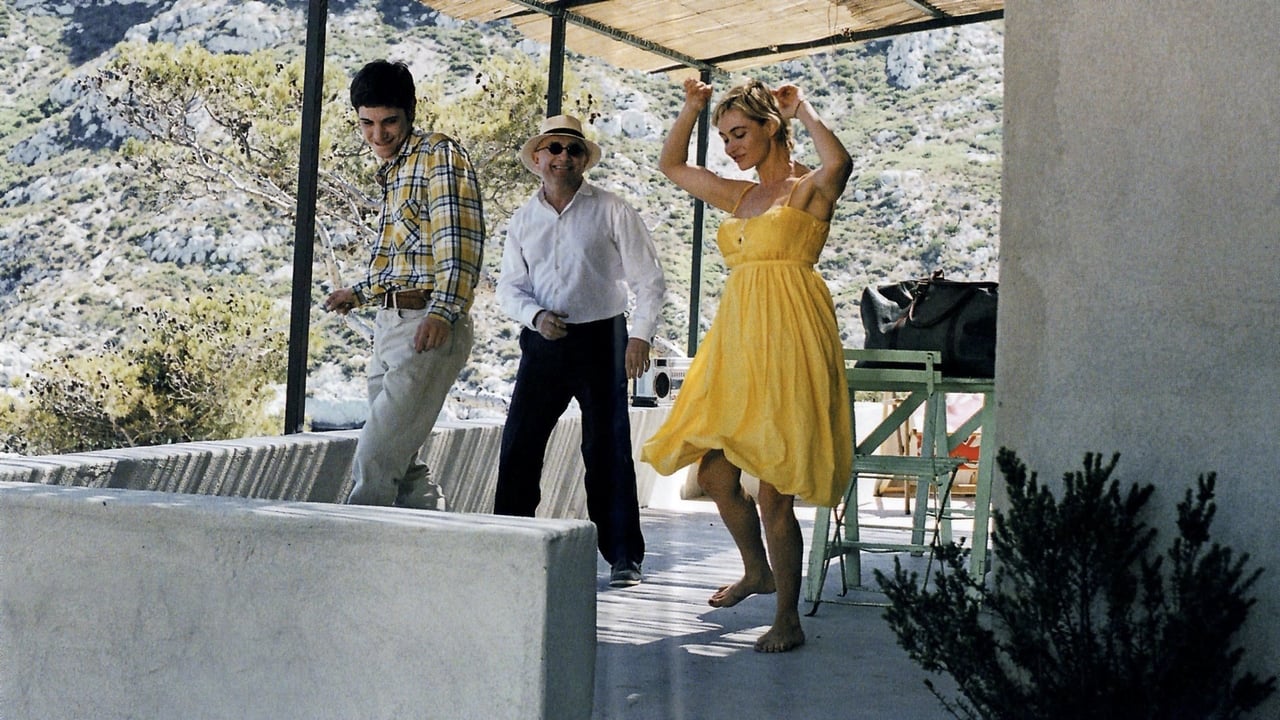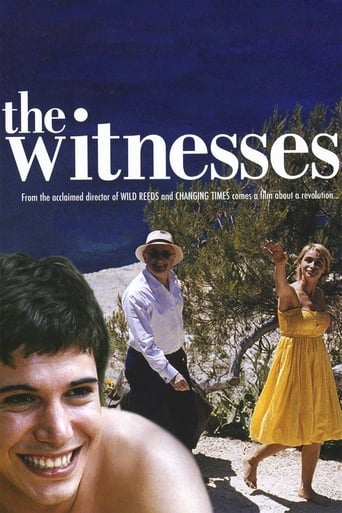GamerTab
That was an excellent one.
ChanFamous
I wanted to like it more than I actually did... But much of the humor totally escaped me and I walked out only mildly impressed.
Sabah Hensley
This is a dark and sometimes deeply uncomfortable drama
Darin
One of the film's great tricks is that, for a time, you think it will go down a rabbit hole of unrealistic glorification.
Robert J. Maxwell
For almost an hour this French story of love and its dynamics slogs along painfully, its object obscured. A policeman of Islamic descent has married a young woman partly for her money. She doesn't care. He's a sexual dynamo. She doesn't even care that he sees other women -- or a man, for that matter.The other man is an innocent-looking young gay guy who is having an affair with a gay doctor, interrupted now by the attentions of the police officer.Everyone goes around shrugging shoulders and gesticulating except the doctor who is fiercely jealous and has lost his young lover. It's all rather comme ci, comme ca, until finally a brief announcement is seen on TV that a mysterious disease is spreading among the gay community.The young man has it, the others don't. The whole business is treated without melodrama and without any overt attempts to engage the viewer emotionally, except insofar as we are saddened by the illness of the innocent young man and we share the anxiety of those who have made love with him. Amor vincit omnia, and then you roll over and go to sleep.I found the sexual juggling a little boring. I didn't really care much who wound up with whom. And the way AIDS was treated was something of a disappointment. Neither moral nor medical questions were raised. It was as if something had intruded into a couple of love affairs and the consequences, though tragic, were also a damned nuisance.The photography is crisp and evocative, the direction efficient, the budget modest. If this doesn't achieve all it seems to have set out for, I still wish there were more efforts made along these lines. My God, what an improvement it is over another Batman movie!I wish the characters had been made more engaging. As it is, I wound up feeling as if I were watching them through the wrong end of a telescope.
gradyharp
Les Témoins (The Witnesses) is another fine artwork by French director André Téchiné that continues to examine relationships in times of stress and through areas of rough travel. As written by Téchiné, Laurent Guyot, and Viviane Zingg this film is a love story and a social commentary on life in 1984 when AIDS raised its ugly head and disrupted lives, hopes and relationships. What could have been a heavy-handed woeful tale is instead a story about ordinary people and how the spectre of the then 'new disease' affected a small group of friends. In the intimacy of the story there is an opportunity to reflect and to see more clearly the atmosphere of that time in history. Sarah (Emmanuelle Béart) is a writer of children's books married to Mehdi (Sami Bouajila), a member of the Paris police force vice squad. They have an open marriage and have just given birth to a baby boy - a factor that disrupts their separate lives while conflicting their married life. Sarah has a physician friend Adrien (Michel Blanc, so memorable in his role in 'Monsieur Hire') who is gay, and while he is older, he still longs for the company of young men. Adrien meets the young catering student Manu (Johan Libéreau), a lad whose sexual appetite is satisfied by trysts in parks, back rooms of bars, etc. Manu and his opera singer sister Julie (Julie Depardieu) live modestly in a sleazy hotel cum brothel that is under surveillance by Mehdi. Adrien and Manu strike up a friendship and are invited to join Sarah and Mehdi to Sarah's mother's cabin by the sea and while there a relationship between Manu and Mehdi begins, one that will become an affair in secret. A strange disease comes to public attention and it is Adrien who is in charge of the investigation of the disease now called AIDS. Though Adrien's ties with Manu have become platonic while Manu see Mehdi daily, Adrien is the first to notice lesions on Manu, lesions that are the hallmark of AIDS. How this discovery affects the lives of each of the characters we have met (the 'witnesses' to a very important time in our history) serves as the crux of the story - part tragedy and part a torch of resilience the weaves the story to a close in an honest, touching but never maudlin manner. The acting is consistently excellent, the sort of ensemble acting that keeps the focus on the message of the film rather than on individual attention to characters. The movie is beautifully photographed by Julien Hirsch and the musical score by Philippe Sarde wisely blends excerpts from Vivaldi and Mozart with original music that recalls the 1980s. This is yet another triumph for André Téchiné - a film that deserves the widest possible audience. Grady Harp
trpuk1968
I agree with some of these comments. By 1984 I thought we were more familiar with AIDS...maybe 82 is the year this should be set. My main gripe was the unconvincing make up Manu wears, and the way he doesn't lose weight. What was so shocking and devastating for those of us growing up with the onset of AIDS was running into people who were gorgeous, fit young and beautiful. Next time you saw them their faces were blemished, their bodies wasted, emaciated, skeletal like. I recall bareley recognising a young lad who'd once been a fixture on the scene. So the scenes where Manu is nursed through the terminal stages were less than convincing and left me somewhat unmoved. Otherwise its worth seeing and its sex positive, uplifting, life affirming attitude is a welcome riposte to Hollywoods schlocky treatment of the subject.
johno-21
I recently saw this at the 2008 Palm Springs International Film Festival. This is the story of Maunu (Johan Libéreau), a young gay man from the country who is past high school but is not attending a university and instead arrives at his sister Julie's (Julie Depardieu) in Paris who is a struggling but talented opera singer and living in a dilapidated hotel where only hookers live. Cruising the city parks, Manhu befriends an older gay doctor Adrien (Michel Blanc) and develops a platonic relationship with him although Adrien is enamored with Manu. Adrien is best friends with Sarah (Emmanuelle Béart) who is a struggling writer and a new mother. Sarah's husband is Medhi (Sami Bouajila) who is a vice cop and the principal parent of their child who Sarah prefers to ignore and doesn't even want to be a mother. Mehi and Manu begin a surprising and unlikely relationship. This is a good movie but seems kind of sliced together in it's storyline. One good character is the streetwalker Sandra (Constance Pollé) who seems like is going to be a central character but then disappears from the film. Manu who has a wealthy benefactor in Adrien impossibly wears the same clothes throughout the film. Medhi and Manu and Medhi and Sarah have absolutely no on screen chemistry. AIDS is treated in 1984 as being so new that no one except the doctor Adrien has ever heard of it before and it's brand new on all the television newscasts yet AIDS was at that new phenomenon point in 1982 not 1984. The relationships between Manu and Adrien, Manu and Medhi, Manu and Julie are never properly developed because there is too much going on in this film. We never really understand how Adrien and Sarah became lifelong friends and it doesn't seem like they really care for each other anyway. Satah and Manu never have any kind of established friendship. Veteran filmmaker, director, writer André Téchiné directs and co-wrote the screenplay with Laurent Guyot and Viviane Zingg. Nice cinematography from Julien Hirsh. Michel Blanc is the commanding acting presence in this film. I would give this a 6.5 out of 10.


